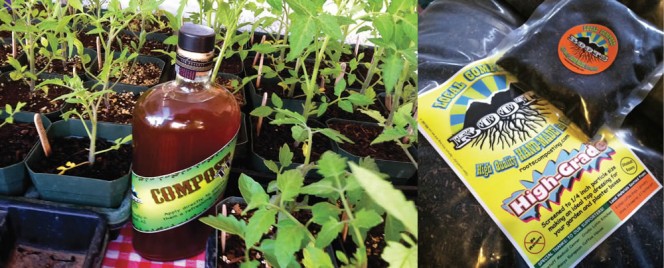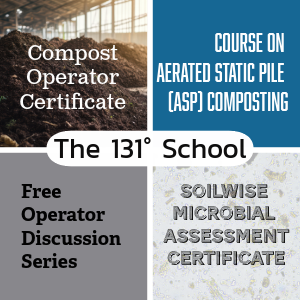We Compost It! in Maine and Roots Composting in Arizona are expanding their operations by aligning with larger companies that have compatible expertise, processing equipment and available land.
Craig Coker
BioCycle July 2015

“Our collaboration allows us to more efficiently use our assets for more than one business unit,” says John Adelman, CEO of CPRC Group (center), along with Brett Richardson of We Compost It! (left) and Jim Hiltner. CPRC’s MB Bark composting facility (right) is in Auburn, Maine. Photos courtesy of We Compost It!
All business owners want their businesses to grow successfully; however, managing the growth process can be a challenge. In the organics recycling industries, growth often means new equipment, more and better trained personnel, access to both feedstock and product markets, and access to new sites in new market areas.
All growth costs money. The traditional mechanisms for financing growth are retained earnings from current operations, new contracts/revenues/profits in the core business, new equity from existing or new investors, debt financing, vertical/horizontal expansion (i.e., a composter vertically integrating by offering compost application services or horizontally expanding into contract grinding on land clearing projects), mergers, and acquisitions. Some in the industry are looking at new approaches to growth by forming strategic partnerships with other firms that bring complementary assets to the relationship.
A strategic partnership is a formal alliance between two commercial enterprises, usually formalized by one or more business contracts but (initially) falling short of forming a formal legal partnership or, agency, or corporate affiliate relationship. Over time, a strategic partnership can evolve into a merger, acquisition, or formation of a new, jointly-held, company. Those that do not evolve into a more permanent arrangement often have a “bell-curve” structure consisting of a “honeymoon” period, a static period and a period of decline before the relationship ends. Nonetheless, they can be quite successful as long as facility owners and managers pay attention to the details.
Fifteen years ago, the author managed a composting business that was involved in strategic partnerships with a pallet manufacturing plant and a dairy farm. The composting facility needed feedstocks and both the pallet plant and the dairy had waste management needs. The pallet plant provided free bark waste that was ground and sold as mulch and free sawdust, which was a carbon source for the composting facility. The dairy farm provided free manure for composting and space for the composting facility. The pallet plant was part owner of the composting facility and the arrangement with the dairy farm was a handshake agreement. The partnerships ended five years later when the dairy farmer retired and sold his herd and the pallet plant found biomass buyers for its woody wastes.
Case Study — We Compost It!
In 2009, Brett Richardson and Greg Williams won the Business Plan Competition at the University of Southern Maine School Of Business, with a business plan entitled “Organic Alchemy Composting: Turning Brown to Green.” The plan envisioned a food scraps collection service and composting facility serving the greater Portland, Maine area. That business plan became Organic Alchemy LLC and its collection service and composting business came to life in 2010. Richardson’s and Williams’ first composting facility was located in a portion of the City of Portland’s Riverside Recycling Facility, which was operated by CPRC Group, a construction-and-demolition debris recycler who was expanding into contract operations of solid waste management facilities. The composting facility was sized and permitted for 3,000 tons/year, which limited the ability of Organic Alchemy to expand its food scraps diversion service. Over time, the business relationship between Organic Alchemy and CPRC grew, and the opportunities for mutual collaboration began.
In 2006, CPRC had purchased an older bark mulch company and created MB Bark, a subsidiary dedicated to both bark mulch processing and landscape products distribution. “MB Bark became a logical mechanism for us to sell our compost,” explains Richardson, now General Manager of the renamed We Compost It! “We had reached capacity with our Portland facility and MB Bark had land available in Auburn. With our new 12,000 tons/year facility in Auburn coming online this year, we have decided to concentrate on food scraps collections, which we are experienced with, and let MB Bark lead in the operation of our new composting facility, as they are very competent in facility operations. Several members of MB Bark’s staff are graduates of the Maine Compost School. In addition to expanding in metropolitan Portland, we can expand our food diversion service to the Lewiston-Auburn area and beyond.” The composting facility in Portland has evolved into a transfer station to efficiently move compostables up to the Auburn site, about 35 miles away, where We Compost It! can take organics without a tipping fee.
John Adelman, CEO of CPRC Group, echoed Richardson’s comments. “We saw several mutually beneficial aspects to our collaboration with We Compost It! It allows us to more efficiently use our assets for more than one business unit, it reinforces our corporate policies about helping young entrepreneurs succeed, and it helps having a paying tenant on our property. We also see the new Auburn facility as a good fit for our community as we can expand the recycling infrastructure available to our customers and to others in this area.” We Compost It! CPRC have an advantageous financial arrangement that allows both parties to benefit from the partnership. We Compost It! is able to concentrate on the growth issues of a new company while devoting fewer resources to operational and administrative concerns. CPRC gets a rent-paying tenant in one of its facilities whose business is very complementary to its other operations.
Richardson believes the relationship between We Compost It! and MB Bark/CPRC worked so well because they shared a similar work ethic, had a lot of confidence in each other, and had good communication. “Don’t forget, there’s only two degrees of separation between any two people in Portland; this is a small area where everyone knows everyone else,” he notes. “We are convinced our collaboration will pay off for both us and them as each of us focuses on what we do best.”
Case Study — Roots Composting
Roots Composting started life two years ago as an outgrowth of a Master’s thesis at Northern Arizona University, which resulted in an on-campus pilot project. The three founders of the resulting company expanded into collecting food scraps from about 25 restaurants, coffee shops and breweries around the Flagstaff area. “Our biggest challenge to growing Roots Composting was an adequate supply of wood chips,” recalls Patrick Pfeifer, the senior founder of the company. “When I learned about the U.S. Forest Service (USFS) Four Forest Restoration Initiative, we decided to reach out to them about access to wood chips.”

Roots Composting’s search for amendments to compost food scraps led it to Good Earth Power AZ, which had just secured a forest thinning contract and needed an outlet for its wood chips. The companies formed a partnership that includes expanding markets for Roots’ end products such as compost tea (left) and bagged products (right). Photos courtesy of Roots Composting
According to the USFS, the overall goal of the 2.4 million-acre footprint of the Four Forest Restoration Initiative (4FRI) is to restore the structure, pattern, composition and health of fire-adapted ponderosa pine ecosystems, reducing fuels and the risk of unnaturally severe wildfires, and providing for wildlife and plant diversity. In addition to creating sustainable ecosystems, one of the key objectives of 4FRI is to create and develop sustainable industries. Appropriately-scaled businesses are playing a key role in the effort by harvesting, processing and selling wood products. The restoration-based work opportunities are expected to create a variety of jobs across northern Arizona.
Phase 1 of the 4FRI was awarded to Good Earth Power AZ (GEPAZ) in September 2013. GEPAZ is tasked with managing over 300,000 acres of forest over the next 10 years. Good Earth Power is a global company with interests in the construction, energy, communications and land development sectors. The company’s global activities are driven by three goals: Sustainable Economic Growth, Community Empowerment and Development, and Environmental Protection. “Partnering with Roots Composting was more than just finding another way of recycling slash from our forest operations,” notes Martin Gillard, Chief Operating Officer for GEPAZ. “It fits in very well with our corporate mission to encourage local businesses to develop under our banner.”
Access to large quantities of amendment creates a growth opportunity for Roots Composting to expand its food scraps collection and composting, as it now has carbon feedstock capacity to handle 60,000 tons/year of food scraps to balance out the wood chips from GEPAZ. The company also will be able to increase the supply of bulk and bagged compost it delivers to various retailers in the Flagstaff area. The composting facility will be co-located and operated in tandem with GEPAZ and a forest thinning operations management company, Campbell Global, between the cities of Flagstaff and Williams.
The synergies between the two companies are strong, according to Pfeifer, as GEPAZ brings capital and market access to Roots, and Roots brings composting technical expertise. “It’s a win/win/win for both of us,” he says, “as both of us can expand in forestland management, composting and in growing our businesses.” Both Pfeifer and Gillard note there were no areas of conflict or any significant clashes of corporate culture. “Patrick and his colleagues all have strong business educational backgrounds which we felt was important as they understood how our company was set up to handle the 4FRI contract,” explains Gillard. “This initial relationship is a basic joint-venture partnership, but, over time, we intend to have them become a new division of GEPAZ, which we will call Good Earth Soils.”
Takeaways
Everyone interviewed for this article offered sage advice to others contemplating a strategic partnership with another firm. “You need to share common goa ls, work ethics and spirit,” says Richardson of We Compost It!, “and focus on thorough due diligence. You need to go wide-eyed into a strategic partnership. Also, make sure communications are clear and robust so that everyone is pulling the canoe in the same direction.” Pfeifer echoes Richardson’s comments. “You need to ensure your goals in the partnership are clearly defined and aligned with the potential partner. In our case we desired access to wood chips, land and equipment and Good Earth Power AZ wanted to leverage its forestry management contract into a local soils and landscape products business.”
Adelman points out that it was important to understand the assets you need to grow, be they machines, land, people, or all three, and to find a partner, or partners, who had those assets. “Many years ago, CPRC Group started out as Commercial Paving and Recycling and now we have evolved to managing recycling centers and transfer stations, established a mulch and landscape supply business, and now, with We Compost It!, we have access to a food scraps diversion and collection company. Each step of the way, we have looked for strategic partners with the assets that would benefit our growth.”
Still, in the end, it’s all about personal relationships. “Nothing makes a strategic partnership succeed like good personal relationships,” says Gillard. “It is critical.”
Craig Coker is a Contributing Editor to BioCycle and a Principal in the firm Coker Composting & Consulting (www.cokercompost.com), near Roanoke VA. He can be reached at craigcoker@comcast.net.














